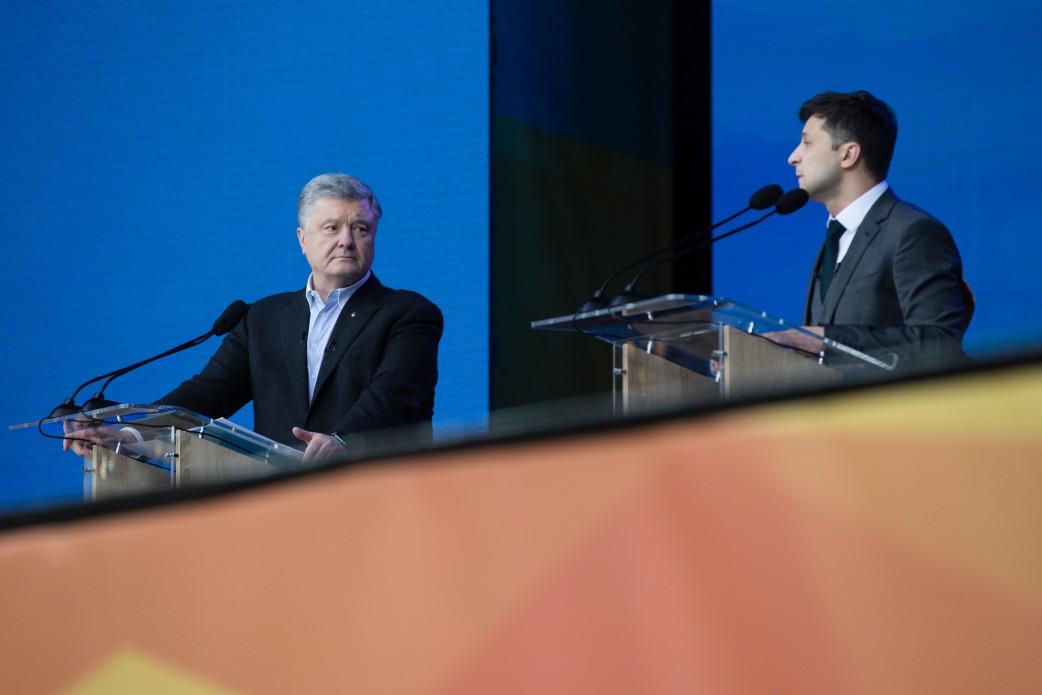Ukraine’s new president and Russian relations

Volodymyr Zelensky defeated Petro Poroshenko in Ukraine’s presidential election in a landslide victory with more than 73% of the votes, but not everyone is happy. Zelensky was already well known for playing a fictional incorruptible president, Vasyl Holoborodko, in the television series Servant of the People. Alexander Motyl, a professor of political science at Rutgers University in New Jersey, has suggested that Zelensky let his television alter ego do his campaigning for him and that Ukrainians don’t know enough about the new president’s real policies.
Motyl has also suggested that Zelensky’s approach could ultimately benefit Russia. Others claim that Russia is gearing up to deal with Ukraine under Zelensky. This has produced fears in some quarters that a Zelensky presidency could lead to Ukraine’s capitulating to Russia. However, both sides have red lines that they’re committed to, so we shouldn’t expect peace anytime soon. But given that Zelensky is a complete political novice, Russia will test him with offers, aggression and everything in between to measure his resolve.
During the campaign, Zelensky was hyped as being pro-Russian by his opponents. Poroshenko’s campaign team even erected a billboard showing Zelensky staring down Russian President Vladimir Putin. Some speculated that was meant to suggest Zelensky might strike a deal with Putin. History suggests that’s unlikely. Since the unseating in February 2014 of the pro-Russian president Viktor Yanukovych, the Kremlin doesn’t believe that such candidates can deliver in Ukraine. That’s precisely the reason for its aggression in the Donbas and Crimea.
Zelensky has stated that Ukraine won’t trade Crimea for peace in the Donbas and advocates a peaceful return of the two regions using a hearts-and-minds strategy with broadcasts into the occupied territories. This is at odds with Russia’s view that Crimea is a done deal. The Donbas will be tricky too. Russia doesn’t see itself as a party to the conflict and insists that it’s a civil war. The war in the Donbas and the status of Crimea are out of Zelensky’s hands. There’s nothing much he can do to change Russia’s positions. Far from being weak on the Donbas, Zelensky says it doesn’t require special status to be reintegrated into Ukraine.
Russia is by no means done with its Donbas gamble. Its ultimate goal is to force the federalisation of Ukraine giving each oblast (region) veto rights over foreign, economic, linguistic and cultural policies. And, most cynically of all, Russia portrays itself as a victim of Ukrainian aggression.
Zelensky will inherit the same dynamics shaping the conflict as existed during Poroshenko’s presidency. Ukraine will keep looking westward whether or not Russia gives back Crimea or the Donbas. Zelensky also is constitutionally bound to seek NATO and EU membership. In Ukraine’s eyes, any sort of peace deal with Moscow would be worth as much as the Budapest Memorandum or the Ukraine–Russia Friendship Treaty. Russia’s and Ukraine’s dynamics are diametrically opposed, which means things will get worse before they get better.
Even though there’s not much hope for peace or compromise, Russia will try to probe Zelensky for openings. Linking issues has been Russia’s modus operandi in Ukraine since 1991, but the stakes are higher today than before. The biggest threats will come from Ukraine’s acceptance of Russian offers that Moscow then attaches conditions to in an attempt to reduce Western support for Ukraine.
We’ve already seen some mixed messaging from Moscow. Ukraine’s Ministry of Foreign Affairs reported that on the day the election results were published, Russia drastically softened its tone in negotiations for the Kerch sailors imprisoned in November 2018. Russian Prime Minister Dmitry Medvedev appealed to Zelensky directly via Facebook, saying that Russia was ready to offer pragmatic solutions to Ukraine’s socioeconomic woes. Viktor Medvedchuk, Putin’s ally in Ukraine, suggested that Russia would be willing to deliver peace in the Donbas in exchange for Crimea and energy discounts.
But the positive rhetoric from Moscow hasn’t been matched in its actions. Russia has suspended oil and petroleum exports to Ukraine. And last week Putin signed a decree speeding up the process for Ukrainian citizens in the self-proclaimed Donbas republics to obtain Russian passports/citizenship, which has been seen as a direct provocation and as undermining the Minsk II process. Zelensky responded to the move by making a counteroffer of Ukrainian citizenship to ‘all people who suffer from authoritarian and corrupt regimes’.
Zelensky also stated firmly that Russia’s actions are a tacit admission of its aggressive role in the Donbas. This could open the door for Ukraine to stop paying pensions in the Donbas and claim that Russia assumes responsibility for people in the Donbas republics. No doubt, there’s ample room for escalation. This sort of mixed messaging is intended to sow confusion and probe Ukraine’s weak spots to extract concessions. How Zelensky replies to future developments will signal what kind of relations he’ll seek with Russia.